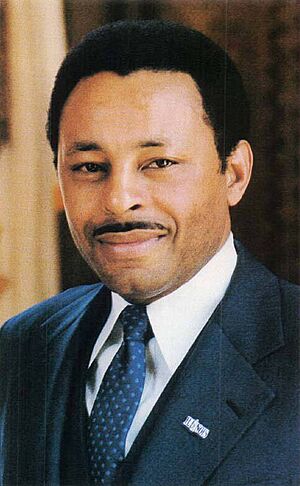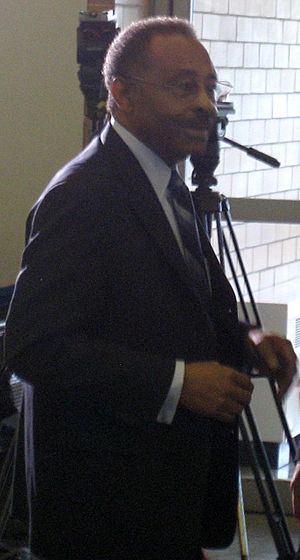Roland Burris facts for kids
Quick facts for kids
Roland Burris
|
|
|---|---|
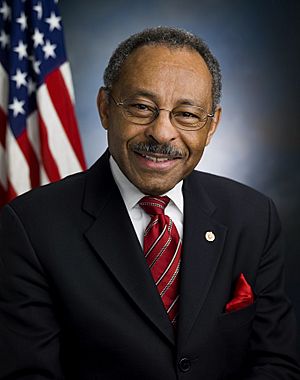
Official portrait, 2009
|
|
| United States Senator from Illinois |
|
| In office January 12, 2009 – November 29, 2010 |
|
| Appointed by | Rod Blagojevich |
| Preceded by | Barack Obama |
| Succeeded by | Mark Kirk |
| 39th Attorney General of Illinois | |
| In office January 14, 1991 – January 9, 1995 |
|
| Governor | Jim Edgar |
| Preceded by | Neil Hartigan |
| Succeeded by | Jim Ryan |
| 3rd Comptroller of Illinois | |
| In office January 8, 1979 – January 14, 1991 |
|
| Governor | Jim Thompson |
| Preceded by | Michael Bakalis |
| Succeeded by | Dawn Clark Netsch |
| Personal details | |
| Born |
Roland Wallace Burris
August 3, 1937 Centralia, Illinois, U.S. |
| Political party | Democratic |
| Spouse | Berlean Miller |
| Children | 2 |
| Education | Southern Illinois University, Carbondale (BA) Howard University (JD) |
Roland Wallace Burris (born August 3, 1937) is an American politician and lawyer. He served as the Attorney General of Illinois from 1991 to 1995. Later, he was a United States senator for Illinois from 2009 to 2010. As a member of the Democratic Party, Burris made history. He was the first African-American person elected to a statewide office in Illinois.
Burris first won a public election in 1978. He became the Illinois Comptroller, a role that manages the state's money. He was reelected to this position two more times. In 1990, he was elected Illinois Attorney General. This made him the second African-American state attorney general in U.S. history. Burris also ran for Governor of Illinois several times but was not successful.
In January 2009, Governor Rod Blagojevich chose Burris to fill a U.S. Senate seat. This seat became open when Barack Obama resigned to become president of the United States. This appointment was discussed a lot because of an investigation into Governor Blagojevich. However, Burris was never found guilty of any wrongdoing.
Contents
Early Life and Education
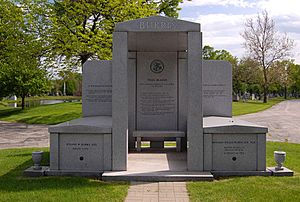
Roland Burris was born and grew up in Centralia, Illinois. This is a small town in southern Illinois. His family's history goes back to enslaved people in the American South. Burris finished Centralia High School in 1955. He then went to Southern Illinois University Carbondale. In 1959, he earned a degree in political science. He also studied International Law in Germany as an exchange student. In 1963, he earned his law degree from Howard University School of Law.
Burris is married to Berlean M. Burris. They have two children and one grandchild. Burris has a special mausoleum built for himself in Oak Woods Cemetery in Chicago. His tombstone says "TRAIL BLAZER" and lists his achievements.
Starting His Career
After law school, Burris worked for the U.S. Treasury Department. He was a National Bank Examiner. From 1964 to 1973, Burris worked at Continental Illinois National Bank and Trust Company. He held several roles, including vice president. He led a group that helped with government-backed loans and minority businesses.
In 1973, Illinois Governor Dan Walker appointed Burris as Director. He led the Illinois Department of Central Management Services. He served in this role until 1977. Burris also worked as a leader for Operation PUSH for a short time in 1977.
In 1985, Burris was chosen as vice-chairman of the Democratic National Committee. This decision caused some debate. This was because another candidate, Richard Hatcher, was favored by the party's Black Caucus.
Illinois State Politics
Burris first ran for Illinois Comptroller in 1976 but did not win. In 1978, he won the comptroller position. He was reelected in 1982 and 1986. He was the first African American to be elected to a statewide office in Illinois. While comptroller, he also ran for U.S. Senate in 1984 but lost.
In 1990, Burris was elected Illinois Attorney General. He was the second African American to hold this type of state office in the U.S. He served from 1991 to 1995. During his time, he oversaw more than 500 lawyers.
One notable case during his term involved Rolando Cruz. In 1992, an Assistant Attorney General working on Cruz's appeal found problems with the original investigation. She resigned when her concerns were not addressed. Later, in 1995, DNA tests showed Cruz was innocent. In 2002, Governor George Ryan pardoned Cruz. He also stopped the death penalty in Illinois, saying the system had too many errors.
In 1993, Burris supported a national handgun ban. He helped organize Chicago's first Gun Turn-in Day. The next year, it was reported that he had a handgun at home. A spokesperson said he had "forgotten about" it.
In 1994, Burris ran for the Democratic nomination for governor of Illinois. He was a strong candidate but lost to Dawn Clark Netsch. In 1995, Burris ran for mayor of Chicago as an independent but lost. He also ran for governor again in 1998 and 2002.
Financial Trust Fund Oversight
When Burris was state comptroller in the 1980s, his office approved a license for a funeral trust fund. This fund allowed trustees to take a percentage of its earnings as fees. Later, in the 2000s, this fund faced financial problems. Burris later worked as a lobbyist for this trust. He has stated that this issue was from a long time ago.
Life Outside Politics
Burris is the manager and CEO of Burris & Lebed Consulting, LLC. This company was started in 2002. Burris also had a small appearance in the movie The Fugitive. He was shown waving to people during a St. Patrick's Day parade scene in Chicago.
Serving in the U.S. Senate
Senate Appointment Process
On December 14, 2008, Burris suggested he could be a temporary replacement for the U.S. Senate seat. This seat was left empty by President-elect Barack Obama. Governor Blagojevich then chose Burris for the seat on December 30, 2008. This decision was controversial because of an ongoing investigation into the governor.
The appointment process faced challenges. The Illinois Secretary of State Jesse White registered the appointment but did not sign the Senate's certification form. On January 5, 2009, the Secretary of the United States Senate said the certificate was not valid. This was because it lacked the Secretary of State's signature.
Senate Majority Leader Harry Reid and Illinois Senator Dick Durbin initially said Burris would not be seated. They cited Senate rules and the U.S. Constitution. Burris tried to claim his seat at the January 6 swearing-in ceremony but was denied entry.
On January 9, 2009, the Illinois Supreme Court ruled on the matter. They said the appointment only needed the governor's signature. They also said Illinois was not required to use the Senate's specific form. After this ruling, Jesse White provided Burris with a certified copy of the appointment. On January 12, 2009, Senate leaders agreed to seat Burris. He was sworn in by Vice President Dick Cheney on January 15, 2009.
During this time, Burris provided more information about his contacts with the governor's team. He stated that the governor's brother had asked him to help with fundraising. Burris said he tried to help but was unsuccessful. He also said he did not donate money himself. This led to further discussions and investigations, but no criminal charges were filed against Burris.
Senate Term and Committees
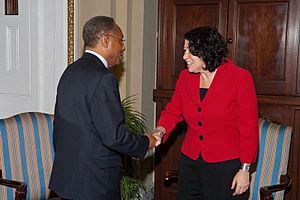
Roland Burris was the only African-American U.S. senator during his time in office. After he left in 2010, it was more than two years until the next African-American senator, Tim Scott, took office in 2013.
During his term, Senator Burris served on several important committees:
- Committee on Armed Services
- Subcommittee on Airland
- Subcommittee on Personnel
- Subcommittee on Readiness and Management Support
- Committee on Homeland Security and Governmental Affairs
- Subcommittee on Federal Financial Management, Government Information, Federal Services and International Security
- Subcommittee on Oversight of Government Management, the Federal Workforce, and the District of Columbia
- Ad Hoc Subcommittee on Disaster Recovery
- Committee on Veterans' Affairs
Decision Not to Seek Reelection
On January 2, 2009, Burris signed papers to run for the 2010 election. However, he later decided not to run. On July 9, 2009, news reports said he would not seek election. Burris officially announced his retirement when his term ended.
His term finished on November 29, 2010. His elected successor, Mark Kirk, then took office. Burris mentioned the high cost of running a campaign as a main reason for his decision. He said he preferred to continue serving the people of Illinois.
See also
 In Spanish: Roland Burris para niños
In Spanish: Roland Burris para niños
- List of African-American firsts
- List of African-American United States senators
- Powell v. McCormack
 | Dorothy Vaughan |
 | Charles Henry Turner |
 | Hildrus Poindexter |
 | Henry Cecil McBay |


